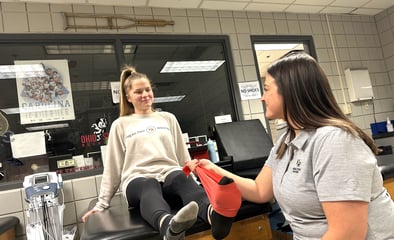New Pennsylvania Bills Aimed at Transforming Athletic Training Services
 In a significant stride toward enhancing healthcare services, the Pennsylvania Senate recently passed two bills aimed at broadening the capabilities and understanding of athletic trainers within the state.
In a significant stride toward enhancing healthcare services, the Pennsylvania Senate recently passed two bills aimed at broadening the capabilities and understanding of athletic trainers within the state.
Spearheaded by Senator Lisa Baker, these bills are poised to modernize the athletic training profession by allowing these healthcare professionals to offer a wider range of services to an expanded group of individuals. Athletic Trainers, often considered heroes in the realm of sports medicine, have historically been confined to a limited scope of practice.
Athletic Trainers, often considered heroes in the realm of sports medicine, have historically been confined to a limited scope of practice.
Current legislation restricts their ability to perform what are deemed "invasive" procedures, which can be as critical as using an epi-pen, administering a rescue inhaler, or providing insulin injections.
These bills, Senate Bill 559 and Senate Bill 560, clarify that, under a written protocol with a licensed physician, Athletic Trainers can perform such lifesaving interventions alongside blister and nail care, administer Naloxone, and inject certain medications.
Senator Baker emphasized that these updates aim to "modernize the definitions used to represent the education and certification of athletic trainers," ensuring that services continue to be delivered under a physician's guidance.
Furthermore, the legislation expands the definition of a "physically active person" to encompass anyone engaging in sports, athletic competitions, performing arts, recreational activities, or military exercises.
This change reflects a broader understanding of physical activity beyond traditional sports, recognizing the diverse needs of Pennsylvania's active population.
Gregory Janik, a clinical professor and athletic trainer with King’s College, highlighted the importance of these bills in increasing access to healthcare by "better defining the populations and procedures that athletic trainers are educated to handle."
The push for these legislative changes is also driven by a need to alleviate the current healthcare provider crisis in Pennsylvania. Tanya Miller, MS, LAT, ATC, NASM-CES, in her letter to the editor, pointed out that Athletic Trainers are often the sole healthcare providers in educational settings.
By allowing them to perform initial assessments and treatments, these bills could significantly reduce the strain on urgent care facilities and hospitals.
Support for SB 559 and SB 560 extends beyond legislative chambers, with endorsements from the Pennsylvania Athletic Trainers’ Society, healthcare groups, and providers across the state.
These bills not only promise to provide equity within the athletic training profession but also aim to ease the burden on healthcare facilities by leveraging the specialized skills and training of Athletic Trainers.
As these bills now head to the House of Representatives for consideration, the future looks promising for Pennsylvania's ATs and the communities they serve.
By expanding the scope of practice and redefining who qualifies as physically active, Pennsylvania sets a precedent for recognizing and utilizing the full potential of athletic trainers in healthcare.
![HR Logo [Recovered]_Full Color Vertical-1](https://blog.healthyroster.com/hs-fs/hubfs/HR%20Logo%20%5BRecovered%5D_Full%20Color%20Vertical-1.png?width=199&height=178&name=HR%20Logo%20%5BRecovered%5D_Full%20Color%20Vertical-1.png)
 By
By


